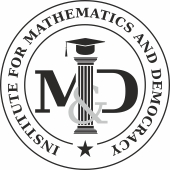SCHEDULE
9:45–10:00 Welcome remarks
10:00–10:30 Beth Campbell Hetrick, Gettysburg College
For the past three years, I have taught a first-year seminar course at Gettysburg College on the mathematics of voting. Unlike any of my other courses, this seminar connects mathematics to current events and politics and social justice issues. At the same time, it pushes students to sharpen their critical thinking and mathematical reasoning skills. In this talk, I’ll discuss my experience teaching the course and guiding discussions during the United States election season. I’ll also share the ways that students have been able to engage in the current conversations on gerrymandering in our state of Pennsylvania.
10:30–11:00 Jonathan Hodge, Grand Valley State University
The intersection of mathematics and democracy is an area rife with opportunity for students of all backgrounds to engage in serious research that both contributes to the field and prepares students for their future education and careers. In this talk, I’ll reflect on nearly 20 years of mentoring undergraduate research in voting and social choice theory. I’ll share some of my favorite projects, give examples of how these projects impacted the students involved in them, and share lessons learned from my role as co-director of Grand Valley State University’s Summer Mathematics REU.
11:00–11:30 Nathan Alexander, Morehouse College & Jalil Cooper, Maynard Jackson High School ’21
Cooperation is a critical factor in our lives as it supports improving democracy and advancing social, economic, and racial justice through evolving notions of mutual agreement. However, through a historical context and the lens of a game theorist, how plausible is cooperation in the American democracy? In this talk, we will approach the classical game of the Prisoner’s Dilemma by critiquing the philosophical foundations of the game, particularly the ideas of rationality and morality. More broadly, we examine the historical role of institutions and systems in denying democracy and advancing justice for all people.
11:30–12:00 Sarah Nielsen, Sunnyvale Middle School
Math teachers spend a great deal of time focusing on students’ procedural fluency and conceptual understanding of the topics being studied. Is there space in the classroom to empower students with mathematical tools and ideas that connect to other fields? How can we incorporate these connections while still addressing the standards?
I was considering this question in June 2020 when I came across Ismar Volic’s article in Education Week, “The Missing Ingredient in Our Democracy: Math.” The article inspired me, along with two other teachers, to create an election math unit for secondary students that we implemented in our middle and high school classrooms this past fall.
In this session, I will reflect on how the unit went and share my students’ thoughts. I will also explore what bringing political science into a math classroom looks like, why it is important for all grade levels, and how to teach it in a way that centers numeracy, student thinking, and citizenship.
12:00–12:30 Stephanie Singer, Portland State University
Sitting on a college campus one can imagine applications of math to elections. But assessing the possible impacts of changes in election rules requires some hands-on experience with elections and politics. Hear the story of a mathematician who wandered waist-deep (at least) into the muck of machine politics, and the concrete, powerful resulting application of mathematics to election verification.
12:30–1:30 Break
1:30–2:00 John Cullinan, Bard College
Ranked-choice voting is a major improvement on plurality voting when choosing between 3 or more alternatives. Among all methods of ranked-choice voting, the Borda Count — assigning points to alternatives based on their place in the ballot — passes many of the most stringent tests for mathematical fairness. Arrow’s theorem tells us that no reasonable voting procedure for 3 or more alternatives can satisfy all fairness tests at once. However, Young showed in the 1970’s that the Borda Count is the optimal way to vote, in a sense that can be made precise.
But what if your true preferences cannot be linearly ranked? Imagine the following scenario: three candidates are running for election, but you do not know any information about one of them. By having to submit a linear ranking of the alternatives, you are not allowed to submit your true preferences (which should somehow incorporate the fact that one of these alternatives is unknown to you).
In this talk, we show that it is 1) possible to assign points to a partially-ordered ballot that generalizes the Borda Count and 2) that this method is the optimal way to vote when using partially ordered ballots. Since linearly ordered ballots are also partially ordered, this result can be viewed as a generalization of Young’s theorem to all partial orders. This is joint work with a former Bard College senior.
2:00–2:30 Rachel Roca, Manhattan College class of ’21
Ranked Choice Voting (RCV) has recently become a more popular voting method that is being adopted around the world. Proponents of RCV highlight how this method promotes majority support and gives more choice to voters. However, having more choice comes with an informational barrier, as voters must be able to provide a ranking of the candidates instead of selecting only one. We explore utilizing Random Sample Voting (RSV) to minimize this informational barrier. By selecting a small random sample of the electorate to vote, the voters may be more easily educated and able to participate in deliberative processes. In this talk, we’ll provide real world context to ground our work in RCV in conjunction with RSV. We’ll answer some of the natural questions that follow from RSV, and discuss how RSV can mitigate the effects of incomplete ballots in RCV elections. This work was conducted with Dr. Jonathan Hodge and Caitlyn Patel as part of the 2019 Grand Valley State University’s Summer Mathematics REU.
2:30–3:00 Andrea Mock, Wellesley College class of ’21
Simplicial complexes are combinatorial and topological objects that have been used to describe complex interactions in various contexts. We use them to model political structures with vertices representing agents in a political system and simplices indicating interactions among them. We interpret some standard topological constructions, such as simplicial maps, wedges, joins, cones, and suspensions in the context of political structures and show that they correspond to processes such as merging structures and introducing mediators. We also introduce the notions of an agent’s viability and the stability of a political system. study the interaction of homology with the model, and indicate how our setup could be upgraded to weighted simplicial complexes that reflect the number of issues the agents agree on.
3:00–3:30 Brian Brubach, Wellesley College
Partisan gerrymandering in the United States is an old problem. However, our most effective tools for measuring and regulating it are fairly new and still not well-understood. This talk will briefly summarize recent techniques used to measure partisan gerrymandering by comparing a given district map to a random sample of possible maps. These techniques have been successfully used in state courts to force maps to be redrawn. We’ll take a close look at how this form of gerrymandering regulation can affect voter incentives. Then, we’ll see how strategic voting can undermine such regulations even in two party elections. Finally, we’ll look toward the future of fairer redistricting with some lessons from algorithmic fairness.




